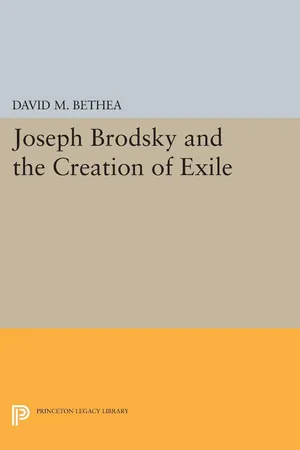
- 340 pages
- English
- PDF
- Available on iOS & Android
Joseph Brodsky and the Creation of Exile
About this book
Joseph Brodsky, one of the most prominent contemporary American poets, is also among the finest living poets in the Russian language. Nevertheless, his poetry and the crucial bilingual dimension of his poetic world are still insufficiently understood by Western audiences. How did the Russian-born Brodsky arrive at his present status as an international man of letters and American poet laureate? Has he been created by his bilingual experience, or has he fashioned the bilingual self as a necessary precondition for writing poetry in the first place? Here David Bethea suggests that the key to Brodsky, perhaps the last of the great Russian poets in the "bardic" mode, is in his relation to others, or the Other.
Brodsky's master trope turns out to be "triangular vision," the tendency to mediate a prior model (Dante) with a closer model (Mandelstam) in the creation of a palimpsest-like text in which the poet is implicated as a triangulated hybrid of these earlier incarnations. In pursuing this theme, Bethea compares and contrasts Brodsky to the poet's favorite models--Donne, Auden, Mandelstam, and Tsvetaeva--and analyzes his fundamental differences with Nabokov, the only Russian exile of Brodsky's stature to rival him as a bilingual phenomenon. Various critical paradigms are used throughout the study as foils to Brodsky's thinking.
Originally published in 1994.
The Princeton Legacy Library uses the latest print-on-demand technology to again make available previously out-of-print books from the distinguished backlist of Princeton University Press. These editions preserve the original texts of these important books while presenting them in durable paperback and hardcover editions. The goal of the Princeton Legacy Library is to vastly increase access to the rich scholarly heritage found in the thousands of books published by Princeton University Press since its founding in 1905.
Tools to learn more effectively

Saving Books

Keyword Search

Annotating Text

Listen to it instead
Information
Table of contents
- Cover
- Contents
- Preface
- Acknowledgments
- A Note on the Transliteration
- Principal Abbreviations
- 1. Joseph Brodsky and the Creation of Exile: A Polemical Introduction
- 2. Brodsky's Triangular Vision: Exile as Palimpsest
- 3. The Flea and the Butterfly: John Donne and the Case for Brodsky as Russian Metaphysical
- 4. Exile, Elegy, and "Auden-Ticity" in Brodsky's "Verses on the Death of T. S. Eliot"
- 5. Judaism and Christianity in Mandelstam, Pasternak, and Brodsky: Exile and "Creative Destiny"
- 6. "This Sex Which Is Not One" Versus This Poet Which Is "Less than One": Tsvetaeva, Brodsky, and Exilic Desire
- 7. Exile as Pupation: Genre and Bilingualism in the Works of Nabokov and Brodsky
- Afterword
- Notes
- Works Cited
- Index
Frequently asked questions
- Essential is ideal for learners and professionals who enjoy exploring a wide range of subjects. Access the Essential Library with 800,000+ trusted titles and best-sellers across business, personal growth, and the humanities. Includes unlimited reading time and Standard Read Aloud voice.
- Complete: Perfect for advanced learners and researchers needing full, unrestricted access. Unlock 1.4M+ books across hundreds of subjects, including academic and specialized titles. The Complete Plan also includes advanced features like Premium Read Aloud and Research Assistant.
Please note we cannot support devices running on iOS 13 and Android 7 or earlier. Learn more about using the app